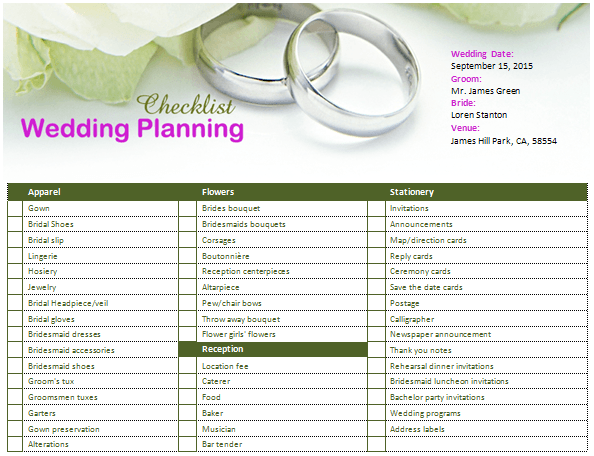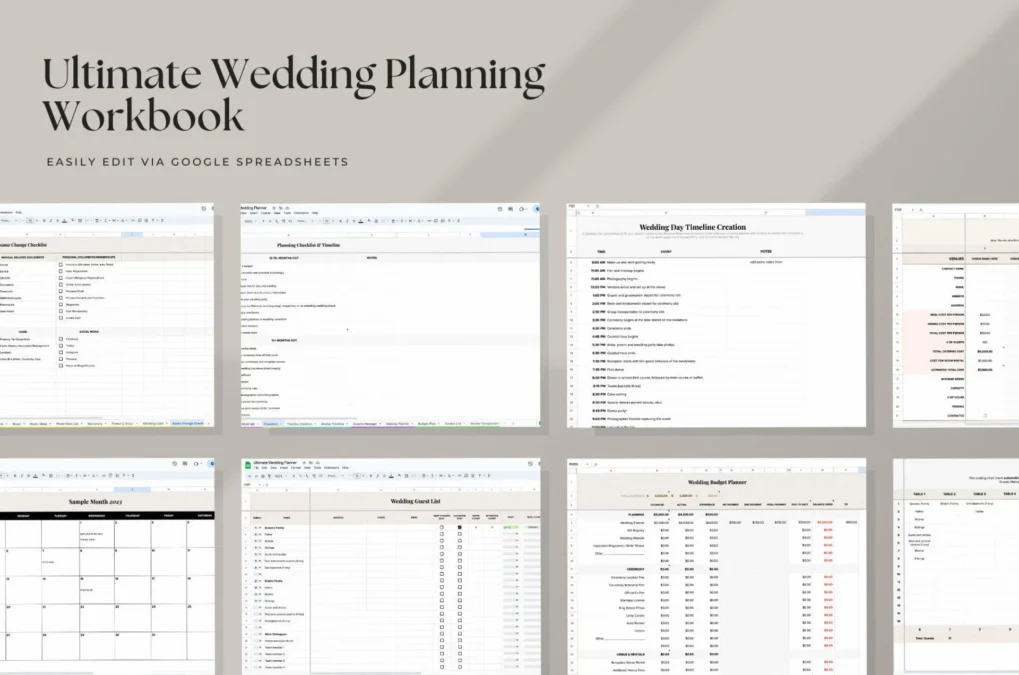Wedding Planning Checklist can feel overwhelming, but with a well-organized checklist, you can tackle every detail methodically. This comprehensive wedding planning checklist is designed to guide you from the first spark of inspiration to the final dance at your reception. Whether you’re a meticulous planner or a last-minute bride/groom, this guide ensures nothing slips through the cracks. Let’s dive in!
Why Use a Wedding Planning Checklist?
A wedding checklist helps you:
- Stay organized and avoid chaos.
- Set deadlines to manage time effectively.
- Budget wisely by tracking expenses.
- Reduce stress with a clear action plan.
Pro Tip: Print this checklist or save it digitally to check off tasks as you go!
The Ultimate Wedding Planning Checklist

Organized by timeline to ensure you’re prepared at every stage.
12–18 Months Before the Wedding
a. Set the Foundation
- Define your vision: Discuss with your partner the type of wedding you want (e.g., intimate, destination, themed).
- Create a budget: Allocate funds for venue, catering, attire, photography, and emergencies (save 10% for unexpected costs).
- Choose a wedding date: Pick a date that works for both families and check venue availability.
b. Book Key Vendors
- Venue: Secure your ceremony and reception site early, as popular locations book 12+ months in advance.
- Officiants: If using a non-religious officiant, book them early.
- Honeymoon: Reserve travel dates and deposits for your destination.
c. Assemble Your Team
- Wedding planner: If needed, hire a professional to manage logistics.
- Bridesmaids/Groomsmen: Ask your squad to join you (allow them time to purchase attire).
6–12 Months Before the Wedding
a. Finalize Vendor Contracts
- Catering: Taste menus and finalize options.
- Photographer/Videographer: Book them early to secure your date.
- Florist: Discuss themes and seasonal flowers.
- DJ/Band: Book entertainment that matches your vibe.
b. Attire Shopping
- Bride’s dress: Start shopping 8–12 months ahead.
- Groom’s suit: Tailoring takes time, so book consultations early.
- Bridesmaids/Groomsmen: Provide color/style guidelines and allow time for alterations.
c. Invitations
- Design and send saves-the-date cards 6–8 months before the wedding.
- Order formal invitations 3–4 months before the event.
3–6 Months Before the Wedding
a. Lock Down Details
- Guest list: Finalize headcounts for the venue and catering.
- Wedding cake: Taste-test flavors and design your cake.
- Transportation: Book cars for the wedding day and honeymoon.
b. Address Logistics
- Accommodations: Reserve hotel blocks for out-of-town guests.
- Rehearsal dinner: Plan the menu, venue, and guest list.
- Wedding website: Create a site for RSVPs, registries, and travel info.
c. Registry
- Create gift registries (e.g., Zola, MyRegistry) and share details on invitations.
1–3 Months Before the Wedding
a. Confirm Bookings
- Re-confirm venue, caterer, photographer, and officiant.
- Final headcount: Submit your guest list to the venue and caterer.
b. Handle Attire
- Pick up bridal party gifts (e.g., jewelry, ties, boutonnieres).
- Final dress/suit fittings: Ensure everything fits perfectly.
c. Finalize Decor and Details
- Flower order: Confirm colors, arrangements, and delivery.
- Signage: Order table numbers, place cards, and ceremony programs.
- Favors: Purchase or DIY wedding favors (e.g., personalized candles, seed packets).
2–4 Weeks Before the Wedding
a. Tie Up Loose Ends
- RSVP deadline: Send reminders to guests.
- Pack wedding-day essentials: Include attire, toiletries, and emergency kits.
- Rehearsal: Practice the ceremony with your bridal party.
b. Beauty Prep
- Book hair and makeup trials (if not already done).
- Purchase beauty products for the big day.
c. Final Payments
- Settle vendor balances (e.g., caterer, photographer).
- Tip coordinators (e.g., venue staff, floral team).
Wedding Week
a. Day-of Coordination
- Pack bags for the night before or honeymoon.
- Charge devices: Phones, cameras, and tablets.
- Relax: Get a massage, manicure, or quiet dinner the night before.
b. Final Checks
- Confirm wedding-day timeline with your planner or officiant.
- Lay out attire and accessories in a clean, organized space.
- Emergency kit: Include safety pins, hair ties, breath mints, and tissues.
The Day of the Wedding
a. Morning Routine
- Breathe: Stay calm and focus on getting ready.
- Document everything: Take photos of attire, details, and emotional moments.
b. Ceremony & Reception
- Enjoy the moment: Smile, dance, and connect with loved ones.
- Delegate tasks: Assign a family member or friend to handle guest questions.
c. Post-Party
- Change into travel attire for your honeymoon.
- Thank your team: Send notes to vendors and family helpers.
Bonus Tips for a Stress-Free Wedding
- Build a buffer: Add extra time for tasks that could take longer (e.g., dress shopping).
- Communicate: Keep your partner and bridal party in the loop.
- Prioritize: Focus on what matters most to you (e.g., intimate moments over perfect Instagram shots).
- Stay flexible: Expect hiccups and adapt gracefully.
FAQs: Wedding Planning Checklist
Q: How do I create a wedding budget?
A: Divide your total budget into categories (venue, attire, catering, etc.) and track expenses with apps like Mint or WeddingWire.
Q: What’s the average cost of a wedding?
A: In the U.S., the average cost is $30,000+, but prices vary by location and size.
Q: How early should I send invitations?
A: Send formal invites 3–4 months ahead so guests can plan accordingly.
Q: Can I reuse my wedding checklist for a destination wedding?
A: Yes! Add tasks like travel arrangements, visa requirements, and local vendor research.
Final Thoughts
A wedding planning checklist is your roadmap to a successful celebration. By breaking tasks into manageable steps and staying organized, you’ll have more time to enjoy the journey. Remember, your wedding day is about love, connection, and creating memories—not perfection.



